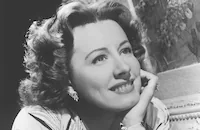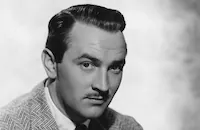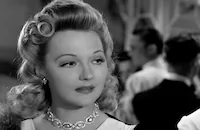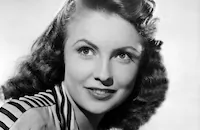Love Affair

Brief Synopsis
Cast & Crew
Leo Mccarey
Irene Dunne
Charles Boyer
Maria Ouspenskaya
Lee Bowman
Astrid Allwyn
Film Details
Technical Specs

Synopsis
Internationally renowned French artist Michel Marnet, who is engaged to marry American industrial heiress Lois Clarke, meets Terry McKay aboard a ship sailing from Naples to America, and falls in love with her. Though Terry, a nightclub singer, is engaged to Kenneth Bradley, the man who saved her career, she falls in love with Michel. To prevent scandal at home, Terry avoids being seen publicly with Michel, but when the ship docks at Madiera, Michel's grandmother, who lives on the island, tells Terry that she, not Lois, is the right woman for Michel. Having received the grandmother's blessing, Terry and Michel's romance flourishes, and before docking in New York, the two make a pact to meet six months later on top of the Empire State building, after they have made successes of themselves. During their separation, Terry moves to Philadelphia and is successful singing in nightclubs, while Michel paints. Both dream of the day when they will be reunited, but tragically, Terry is struck by a car on her way to the rendezvous. In the hospital, she is told that she may be crippled for life, but that her fate will not be known for certain for another six months. Because of her condition, Terry decides not to tell Michel what happened and does not contact him at all. While recuperating, Terry gets a job at an orphanage. One evening, while attending a theater performance, Terry and Kenneth see Michel with a female companion. Terry and Michel greet each other, but do not acknowledge each other as recent lovers. Kenneth expresses interest in getting Terry back together with Michel, but she insists on waiting until she is well. After having tracked her down, Michel pays Terry a visit at her apartment, where he discovers her condition, forgives her silence, and assures her that they should always be together regardless of her condition.

Director

Leo Mccarey
Cast

Irene Dunne

Charles Boyer

Maria Ouspenskaya

Lee Bowman

Astrid Allwyn
Maurice Moscovich

Scotty Beckett

Bess Flowers
Harold Miller

Joan Brodel
Del Henderson
Frank Mcglynn Sr.
The Robert Mitchell Boychoir
Crew
James Anderson
Harold Arlen
S. N. Behrman
John L. Cass
Mildred Cram
Delmer Daves
B. G. De Sylva
Edward Dmytryk
Howard Greer
Al Herman
George Hively
Ted Koehler
Rudolph Maté
Leo Mccarey
Leo Mccarey
Van Nest Polglase
Darrell Silvera
Edward Stevenson
Donald Ogden Stewart
Douglas Travers
Vernon L. Walker
Roy Webb

Photo Collections
Videos
Movie Clip



Trailer
Hosted Intro
Film Details
Technical Specs

Award Nominations
Best Actress
Best Art Direction
Best Picture
Best Song
Best Supporting Actress
Best Writing, Screenplay
Articles
Love Affair (1939) - Love Affair
Love Affair teams debonair French actor Charles Boyer and the elegant Irene Dunne for the first time as the ill-fated lovers Michel Marnet and Terry McKay. Boyer is perfect as the privileged lothario to whom everything has always come too easily, and Dunne is lovely as the down-to-earth woman who wins his heart. Boyer and Dunne both claimed this film as their personal favorite and recalled great camaraderie during the production, save for the one problem of never having a complete script to work with. Pages were re-written almost daily, so the actors didn't bother memorizing lines for fear they would be scrapped the next day. Many rewrites tried to fix a distinct gap that emerged between the lighter first half of the movie on the ship and the more dramatic second half on land. McCarey compared the problem to the inevitable letdown one feels after any vacation and struggled to find the right element to bridge the two parts cohesively. It was Boyer's own suggestion that a scene between Michel and his grandmother (Maria Ouspenskaya) be built up into something more substantial. The resulting mid-film sequence proved to be just the right ingredient that made it all work. It became a pivotal moment that gave added power to the characters, and it turned into one of the most touching parts of the whole film.
Love Affair was well received during its original release, and its Oscar-nominated song "Wishing" became one of the most popular tunes of that summer. It garnered six Academy Award nominations in 1939, but didn't stand a chance against the epic, Gone With the Wind, which swept the awards that year. McCarey remade the film himself in 1957 as the highly successful An Affair to Remember with Cary Grant and Deborah Kerr. This time he added luxurious color and CinemaScope to the story, creating another classic tearjerker. After director Nora Ephron affectionately referenced An Affair to Remember in her 1993 hit Sleepless in Seattle, the story of Love Affair reached a whole new generation of fans who discovered its timeless charm. Another remake followed in 1994 reclaiming the original title Love Affair, this time starring real-life husband and wife Warren Beatty and Annette Bening along with the legendary Katharine Hepburn. Original stars Boyer and Dunne went on to star in two more films together, When Tomorrow Comes in 1939 and Together Again in 1944.
One interesting product placement bit of trivia: The champagne industry was interested in promoting a new product: pink champagne. In one scene, Charles Boyer and Irene Dunne gazed into each others' eyes while sipping on pink champagne, and sales went up immediately afterwards.
Producer/Director: Leo McCarey
Screenplay: Mildred Cram (story), Leo McCarey (story), Delmer Daves, Donald Ogden Stewart
Art Direction: Van Nest Polglase
Cinematography: Rudolph Maté
Costume Design: Howard Greer, Edward Stevenson
Film Editing: Edward Dmytryk, George Hively
Original Music: Harold Arlen (song), Buddy G. DeSylva (song) (as B.G. DeSylva), Roy Webb Cast: Irene Dunne (Terry McKay), Charles Boyer (Michel Marnet), Maria Ouspenskaya (Grandmother Janou), Lee Bowman (Kenneth Bradley), Astrid Allwyn (Lois Clarke).
BW-89m.
by Andrea Foshee

Love Affair (1939) - Love Affair
Quotes
Trivia
Notes
The working title for this film was Love Match. According to modern sources, two weeks before the film was set to go into production, the French embassy, which had been consulted on historical information pertaining to the script, informed RKO that it would not allow the film to be made because it portrayed an illicit affair between a French man and an American woman. The French embassy felt that, because of the war, France could not afford to alienate American sympathies for its people. The embassy threatened to have Paris protest to Washington if the picture went into production. As a result, production was abandoned and a new script was written by Delmer Daves, who transformed the story into a bittersweet comedy about two lovers who meet on a ship. Modern sources also note that Irene Dunne's character was based on a woman Daves met on a ship returning from Europe. The woman was reportedly wisked off to Europe to stave off a scandal resulting from her affair with a government official in a small town. According to a Hollywood Reporter pre-release news item, production on the picture was suspended on November 29, 1938 to give writers Daves and Stewart time to polish the script, and to allow Dunne and Boyer to rehearse their final scenes. A biography of Charles Boyer notes that once filming began, much of the day-to-day production routine was characterized by last minute script alterations and Boyer's ad-libbing. Boyer considered this to be his favorite among all his American films. The Boyer biography also notes that Buddy DeSylva's song "Wishing," which was performed by Dunne, along with the Robert Mitchell Boys Choir, became one of the most popular songs of 1939. Although Hollywood Reporter pre-release news items list actors Marian Folsey, Mary Bovard and Helene Millard in the cast, their appearance in the released film has not been confirmed.
According to the file for the film in the MPAA/PCA Collection at the AMPAS Library, the PCA strongly objected to an early version of the treatment, and stated that it was "so violently in conflict with both the spirit and the letter of our Production Code" that it could not be approved. In a letter to RKO, dated September 15, 1938, the PCA called Love Affair a "low-toned, sordid story of gross sexual irregularities, without even a semblence of what we call 'compensating' moral values." Two weeks later, after examining a refurbished treatment, the same PCA official called the story "satisfactory," but expressed reservations about the portrayal of "Terry" as a kept woman. The PCA later insisted that in order to receive a Production Code seal, the film must adhere to the Code's establishment that the "immoral conduct of these people must not be condoned, nor justified, nor made to appear right and acceptable." In addition, the PCA reminded RKO that "both immoral parties must by punished." Further recommendations from the PCA came in December 1938, when it suggested that the final scene of the film include a shot of "Terry" walking up the road with a cane "to add some flavor of tragedy into the ending." According to a February 1939 PCA memorandum, director Leo McCarey wanted to restore a scene that he had previously agreed to remove. The scene had to do with "Terry" being visited in her penthouse apartment by the man who had been keeping her. The memo also indicates that the film was given a preview showing "out of town" on February 18, 1939, with the scene in question left in, in order to test its importance to the film. Six days after the preview, the PCA reported that the scene would not be included in the picture. In the end, all references to illicit sex were removed from the film.
The film received Academy Award nominations in the following categories: Best Picture; Best Original Story (Mildred Cram and Leo McCarey); Best Actress (Irene Dunne); Best Supporting Actress (Maria Ouspenskaya); Best Interior Decoration (Van Nest Polglase and Al Herman); and Best Song ("Wishing").
Irene Dunne and William Powell were featured in a Lux Radio Theatre broadcast of Love Affair on April 1, 1940; and Dunne and Boyer starred in a July 6, 1942 Lux Radio Theatre broadcast of the story. Love Affair was remade by McCarey for 20th Century-Fox in 1957 as An Affair to Remember, with Cary Grant and Deborah Kerr.

Miscellaneous Notes
Conrad Hall was nominated in the feature film category of the Outstanding Achievement Awards (1994) sponsored by the American Society of Cinematographers.
Nominated for Best Actress (Irene Dunne), Best Actress in a Supporting Role (Maria Ouspenskaya), Best Art Direction (Van Nest Polglase, Al Herman), Best Music-Song ("Wishing" - Music and Lyrics by Buddy de Sylva), Outstanding Production, and Best Writing-Original Story (Mildred Cram, Leo McCarey).
Released in United States 1939
Shown at Los Angeles County Museum of Art (LACMA) as part of program "Twentieth Century Fox and the Golden Age of CinemaScope" July 3 - August 15, 1998.
An updated version of Leo McCarey's film "Love Affair" (USA/1939), starring Charles Boyer and Irene Dunne. McCarey directed a 1956 remake of his own film entitled "An Affair to Remember," starring Cary Grant and Deborah Kerr.
Film is a remake of the 1939 feature "Love Affair" and was remade again in 1994's "Love Affair", starring Warren Beatty and Annette Benning.
The third feature for Glenn Gordon Caron, following "Clean and Sober" (USA/1988), which marked his feature directorial debut, and "Wilder Napalm" (USA/1993).
Began shooting August 11, 1993.
Completed shooting January 21, 1994.
CinemaScope
Released in United States 1939

















